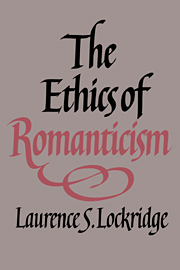Book contents
- Frontmatter
- Contents
- Acknowledgments
- Editions and abbreviations
- Introduction
- PART ONE THE WILL TO VALUE
- PART TWO AGENT, POWER, SCENE
- PART THREE THE PRESSURE OF REALITY
- 6 Shelley and the poetry of life
- 7 Hazlitt: common sense of a dissenter
- 8 Keats and the ethics of immanence
- 9 Byron: the world as glorious blunder
- 10 The ethical bearing of literature
- Select bibliography
- Index
7 - Hazlitt: common sense of a dissenter
Published online by Cambridge University Press: 16 September 2009
- Frontmatter
- Contents
- Acknowledgments
- Editions and abbreviations
- Introduction
- PART ONE THE WILL TO VALUE
- PART TWO AGENT, POWER, SCENE
- PART THREE THE PRESSURE OF REALITY
- 6 Shelley and the poetry of life
- 7 Hazlitt: common sense of a dissenter
- 8 Keats and the ethics of immanence
- 9 Byron: the world as glorious blunder
- 10 The ethical bearing of literature
- Select bibliography
- Index
Summary
Of the great nineteenth-century essayists, Hazlitt leaves the largest body of writings specifically directed to moral questions. From his first publication, An Essay on the Principles of Human Action (1805), to such late essays as “On Disagreeable People” (1827), “The Main Chance” (1828), and “The Sick Chamber” (1830), he develops a moral commentary that rivals Samuel Johnson's in its comprehensiveness. Complaining of Johnson that his “reflections present themselves like reminiscences; do not disturb the ordinary march of our thoughts,” and that Johnson is “a complete balance-master in the topics of morality” (VI 100–2), he himself writes to disturb us, even though he entertains little hope that he will change us. Hazlitt has a resoluteness, clarity, and pointed irony that are winning after the laborious problematics of visionaries, opium-eaters, and infidels. He is the best writer of the period.
Hazlitt is more a moral dissenter than a socio-political reformer like Shelley, whatever the progressive character of many of his political views. He does not cast his eye on futurity with the passion or hope of the poet. But he shares with Shelly and others a dismay at the slippage to orthodoxy of the period's larger minds – Burke, Coleridge, and Wordsworth. This seems to Hazlitt a desertion of the ethical center he finds in the human being's sphere of free agency – free of coercive orthodoxies of church and state, and free of social pressure and prejudice.
- Type
- Chapter
- Information
- The Ethics of Romanticism , pp. 333 - 379Publisher: Cambridge University PressPrint publication year: 1989

